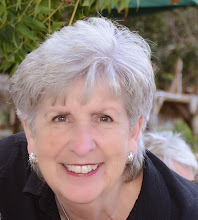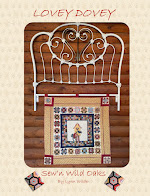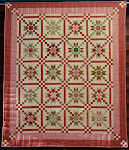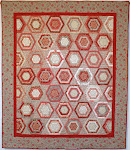Hello Everyone,
Well, it's the 5th day of the month and time for me to post another chapter of my Packhorse Librarian story to go along with the Bridle Path Block of the Month. If you missed Month #1, it is posted HERE. I encourage you to read it before you venture into chapter #2 below. This is the diary that my fictional packhorse Librarian is writing to her young daughter, Grace.
Chapter #2 Month #2
October 1935
Dear Grace,
I’m
going to describe our little town of Cob Hill so when you are old enough to
read this, you will know what your town looked like when you were a
toddler. This might seem meaningless
because the town hasn’t changed much since I’ve been alive for the past 22
years. The main change is some of the
old-timers are no longer with us. A
couple of the businesses have shuttered their doors and windows from the Great
Depression and the slowdown in the demand for coal. Some of the shops are just hanging on for
dear life.
I’ll
start my description of our area at the end of town with Jenny Kenline’s
house. It’s a small white clapboard
house with a nice porch which she converted into a big sunroom. You can see her
sitting out in the sunroom in her rocking chair rocking, just rocking and
looking out her large windows during every season of the year. She keeps time rocking back and forth to the
clatter of the railroad cars passing by. She really kicks her rocking chair into high
gear as the train gets closer and closer to her sunroom. My mama always told me
that Jenny always had two trains of thought at the same time, but they were
never traveling in the same direction; maybe all the rocking rattled her brain.
The
town named Jenny the ‘grief catcher’.
She lives right across the street from Craig Memorial Congregational
Church; and she’s always on hand with a plate of cookies, or if she gets really
inspired, she will make her famous carrot cake which she always makes for the
annual church bizarre. She is present at
every funeral so she could help take away and shoulder the burden of sorrow and
grief. Jenny was there for me when my Paul, your daddy was killed in the mine
accident. I was beyond consolation, and she knew it, so she kept her distance.
Somehow, and I don’t recall how, her famous carrot cake ended up in my cabin
and it was greatly appreciated. Jenny
always used to say the church bells ring in the time of happiness and sorrow, always
sounding the same for every event. Just
as the tears cried by the rich and poor are the same.
Reverand
Cameron was the pastor at the church across the street from Jenny and was the
recipient of many of Jenny’s cakes and cookies as evidence by his rotund
stature. He had the whitest hair I’ve
ever seen and sports a white paintbrush mustache. During the service I would watch his mustache
move up and down and lengthen with his smile. Maybe I shouldn’t let my mind
wander and concentrate more on the message and significance of the sermon.
The
front of the church is a beautiful stone building. Carefully selected stones
hold up two white wooden pillars which support a white covered front porch
before you enter the sanctuary. This is
where you were baptized Grace, by the portly Reverand. Jenny was also there
with a plate of cookies. I find it hard
to go to church on Sundays as I feel that the cemetery in the back is just a
graveyard of painful memories.
My
grandma, your great-grandmother lives around the corner from Jenny. I always called her Grandma Millie. Her given name was Emilie Elizabth which she
immediately shortened to Millie, so she didn’t have to write her long name in the
Palmer Method of cursive writing. I guess that is why I shortened my name to
Lexie. Grandma learned to write cursive
long before Mrs. Van Asperen was born so grandma was never the recipient of the
swat of the ruler on her knuckles.
Grandma
Millie lived in a small yellow, stucco house.
The largest room in the house was the kitchen, probably because that is the
location of the wood stove she used for cooking and heating. She has a little blue kindling box next to
the big black stove, which my daddy always kept filled for her, so she could feed
the stove and maintain a steady temperature while baking. Grandma Millies always was a temperate woman.
She always knew when it was time to toss in another piece of kindling.
She
loved a new product called Bisquick which was invented in 1931 by General
Mills. One of the company’s top
executives was traveling by train and complimented the chef on his biscuits.
The chef shared his recipe for his pre-mix of lard, flour, baking powder and
salt which he kept on ice and could quickly fresh biscuits every morning.
Within a year, Bisquick was on store shelves and didn’t need refrigeration with
the addition of hydrogenated oil.
Grandma
Millie loved to bake and find new recipes so she could use Bisquick. Her recipe
for Wheat Germ Bread is delicious! I
always wondered how bread named after a germ could be healthy yet so delicious.
Across the railroad tracks from the church sits the old
train depot. No passenger trains run
through Cob Hill, only train cars loaded with coal and lumber. The spur of iron rails ran for only 31 miles
and stopped at several coal mines and Leonardo’s Mill. During the heyday of
coal mining, the loaded cars ran on a regular basis and Jenny watched and
rocked to every car…..counting train cars, always counting and rocking.
Across the tracks from Jenny’s house is Old Doc Wood’s
office. My daddy always referred to Doc
Wood as Old Doc Wood. I’m beginning to think there never was a young Doc Wood
and it’s hard to imagine what he would look like when he was a young man. His back is so bent it’s as though he carries
every care, worry, and aliment of the entire town on his back. He looks at you
over the top of his horn-rimmed glasses and makes his assessment of your
condition, then lowers his head again as it takes too much effort to elevate
his head. I often thought his glasses
were too heavy and suggested to my mama that he should wear wire-rimmed glasses
like Grandma Millie.
His office is dark brown with a large and long,
slanted roof. When I was young, I always
wondered what it would be like to slide down that roof when it was covered with
snow and land in the snowbank. My good
manners and sense of propriety, and fear of getting in serious trouble stopped me from
attempting this feat of daring.
When you walked into the Old Doc Wood’s office your nose was immediately assaulted
with the strong smell of antiseptic. You
could be cured of what ailed you just by spending some time in the waiting room,
and wait we did! The poor man is a one man show with only one nurse who looked
a bit haggard yet very efficient in her white cap and uniform. Old Doc Wood
could treat minor illnesses and conditions, but those with more serious
injuries or ailments had to travel 30 miles to the nearest hospital. He also
makes many house calls which gives his nurse time to get caught up on paperwork.
For some reason, Old Doc Wood took a liking to me and
suggested that I read and learn as much information as I could about Clara
Barton, a self-taught nurse during the American Civil War. I think he wanted me
to join his practice to relieve his haggard nurse. Our very small lending library has a set of
Encyclopedia Brittanica which was first published in England in 1768. I think that edition is in our little library!
This made it impossible for me to find out any information about Clara and
nursing. I finally found some
information about Clara in a larger library in another town and decided being a
nurse was not for me. I’m afraid I had
to disappoint Old Doc Wood when I told him he would have to look for another nurse
trainee. He stared at me over his
glasses, bowed his head, and walked back into the antiseptic-smelling waiting
room in search of another willing candidate to be his antiseptic assistant.
Across the road from Old Doc Wood’s office is Gillette’s
Rexall Drug Store which is very handy for those needing a prescription filled. There was a soda fountain against the side
wall of the store, and it was so much fun to sit and spin on the tall stools. On a very rare occasion, my daddy would take me
to the soda fountain for a chocolate malt.
They cost 15 cents and that was a lot for him to splurge on me.
I remember one time going to the drug store with my daddy
to buy a bottle of Evening in Paris perfume for my mama for Christmas. I think mama was a bit embarrassed at the
extravagance and wanted him to take it back…..which he refused to do. Now I realize it was such an impractical gift
when we had so many other needs. She
used it sparingly over the years, and to this day the bottle is quite full. I
remember her saying it was a silly gift because the fragrance vanished in the
wind just like the precious money he spent on it.
On the same side of the street as Gillette’s Drug
Store is the office of the Cob Hill Quill.
When our family went to town, we frequently stopped into the Cob Hill
Quill just to inhale the smell of the ink and watch the linotype machine in
action. I decided that ink was in my blood and that’s what I wanted to do with
my life, spend my days here with the smell of ink permeating my skin and senses
instead of antiseptic. I wanted to wear an
ink-stained apron instead of a pristine white cap and uniform.
My mama was always anxious to get her bi-weekly copy of
the Cob Hill Quill after they started their new Nimble Thimble column. She
loved reading the column and seeing new quilt patterns such as Bridle Path
which she is now making. She loves exchanging ideas with other quilters across
the country and has several pen pals who she writes to on a regular basis. Her
favorite pen pal is Mrs. Delma Doffin from Lafayette, Indiana. They swore that
someday they would meet and quilt their days away. Mama was sure a patchwork
epidemic was going to spread across Kentucky, and she wanted to be on the
forefront of the wave of new quilting ideas.
I wonder if Old Doc Wood is going to be able to treat this new epidemic?
My mama always said that when she wound a bobbin, she
wrapped all her worries around it and quilted them into the quilt so they couldn’t
work their way back into her troubled mind. I offered to wind all her bobbins, but she
wasn’t about to hand that job over to me. I would have to find my own way to unravel my
troubled mind. I guess I’d better take up quilting and start winding my own
bobbins.
Across the street from the Cob Hill Quill is Haggard’s
five and dime. Just a footnote here, the
haggard nurse in Old Doc Wood’s office is no relation to the Haggard
family. I would love to go into the
store, walk right by the penny candies and head straight to the book section in
the back corner of the store. Secretly I
would try to read a few pages of the Bobbsey Twins books each time I visited
the store. I would pretend and wished I
was Nan Bobbsey who had such an interesting life with her twin brother
Bert. I was horrified when the book I
was reading a few pages at a time was no longer on the rack! I never did find out the ending to The
Bobbsey Twins at the Seashore. Although
I had never seen the sea, I felt as though I was there and could taste the
saltiness on my tongue and have the waves wrap themselves around my feet and
legs tugging me into the foam and deeper into the sand. I was so distraught at
the loss of the book, I wanted to go back home and wind a bobbin.
Also on that same side of the street is Horner’s
Department Store. I think Mr. Horner
must have taken Mrs. Van Asperen’s Palmer Penmanship Method of writing because the
capital ‘H’ on the front of the building was certainly painted on the storefront
with a flourish. There were more curly que’s than Mrs. Van Asperen could ever include
in a capital H.
The scent of leather was strong when you walked into
Horner’s. Men’s clothing is on the right-hand
side of the store, household goods in the front and women’s and children’s clothing
in the back. Very seldom did my mama buy
me anything to wear as she usually made my clothes, but when she bought
something new it came from the sale rack and was only for a special
occasion. When I wore the article of
clothing, I smelled like leather, and years later I still remember the
smell.
Also, along the street there was a Western Auto that
always had shiny new bikes in the window every Christmas. If I had one of those
bikes, I would ride it all the way to the ocean and make up my own ending to
the Bobbsey Twins at the Seashore.
Stratton’s Market was the mainstay on the street. The clerks walked around with feather dusters
poking out of their back pockets. I disliked
dusting at home, and I can’t imagine having to dust the top of every can of
peas and beans in an entire store! The
old wooden floors of the store creaked and groaned like a haunted house with
every step.
The butcher would stand behind the case full of a nice
selection of meat and wait to fill your order in a blood-stained apron. How did he ever get that apron clean? I know when mama is hand quilting and occasionally
pricks her finger, she gets the little blood stain out of her quilts by licking
it with her own saliva. I can’t picture
the butcher doing that. I would much
rather wear an ink-stained apron.
Toward the end of the street is our dentist, Doc
Young. My daddy never called him Old Doc
Young. That just would have been too
odd, even though Doc Young was older than Old Doc Wood. Doc Young’s office had a horrible smell of drilled
teeth ready to be filled with mercury fillings.
Doc Youngs wife, Laverne, is one of mama’s best friends. She likes to quilt, and they often get
together and enjoy their shared love of quilting.
Close to the market is our little lending library
which is quite small with an even smaller selection of books. I love the smell
of the library, and the smell of a book when it is opened. It is as though I’m
breathing the words in through my nose instead of using my eyes.
There is a room in the back where we packhorse
librarians will be gathering books, and catalogs to pack into our saddlebags
and take out into the hollers to those who can’t make it into town. Next month
in November, we are going to have a book drive sponsored by none other than Mrs.
Jerome Reginald Steiniger, the ‘pearl-sucking-prude’. I can’t wait to see just how many books we collect
so we can get more of the written word out to those who crave it. I firmly
believe that literacy will change the community and reading will open the door
to the world.
This is a chapter about smells and how they trigger powerful
memories just as clear as though it was yesterday. Those memories are vivid and
evoke an emotion so strong it can’t be ignored.
I hope you experience this strong emotion Grace when you are older, as
the smells transport you back to the past filled with memories.
Soon,
Mama
P.S. Author's note. My real grandmother is Emilie Elizabeth and the recipe for Wheat Germ Bread is written in her own hand. The recipe is very good and was a mainstay at our table while I was growing up. I suggest you do not use toasted wheat germ.
Several years ago, I made a quilt with all Marcus Fabrics. I named the quilt Emilie Elizabeth in honor of my wonderful grandmother.
Here's a picture of the real Emilie Elizabeth.....a true gem, a card shark at Bridge and Canasta, funny, and a greatly loved woman and role model for me. She wrote the book on how to be a grandma. She also taught me how to quilt.
Thank you, Grandma.




























































Loved this chapter, Lynn! This journey you are taking us all on is incredible. Loved the references to the familiar people and places we grew up with. And loved the photo and tribute to Grandma. You described her perfectly! She was the perfect grandmother! She would be so proud of you and all you have done! Can’t wait for the next chapter!
ReplyDeleteGail
So enjoyed reading this to go along with Bridle Path. I can identify with sewing on a Featherweight and to enjoy baking, especially bread! Looking forward to this months fabric delivery…
ReplyDeleteAmazing story Lynn. Where do you find the time to do this along with everything else you do. Retired: right, in your dreams. Thanks for the posting of this chapter.
ReplyDeleteWow! Such a walk down memory lane . . . Millie's handwriting, her recipe, the photo of her. So evocative and transporting: the power of scents.
ReplyDelete